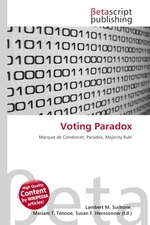Voting Paradox
Lambert M. Surhone, Miriam T. Timpledon, Susan F. Marseken
бумажная книга
High Quality Content by WIKIPEDIA articles! The voting paradox (also known as Condorcet's paradox or the paradox of voting) is a situation noted by the Marquis de Condorcet in the late 18th century, in which collective preferences can be cyclic (i.e. not transitive), even if the preferences of individual voters are not. This is paradoxical, because it means that majority wishes can be in conflict with each other. When this occurs, it is because the conflicting majorities are each made up of different groups of individuals. If C is chosen as the winner, it can be argued that B should win instead, since two voters (1 and 2) prefer B to C and only one voter (3) prefers C to B. However, by the same argument A is preferred to B, and C is preferred to A, by a margin of two to one on each occasion. The requirement of majority rule then provides no clear winner.
Данное издание не является оригинальным. Книга печатается по технологии принт-он-деманд после получения заказа.


